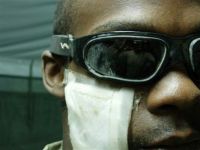WASHINGTON, Jan. 9, 2012 — Next month will mark a major milestone in advancing care for wounded warriors suffering debilitating eye injuries with a ribbon-cutting at the Walter Reed National Military Medical Center in Bethesda, Md.
 |
| Army Pfc. Douglas K. Phillips a member of the 3rd Infantry Division’s Company A, 1st Battalion, 15th Infantry Regiment, deployed to Durai-ya, Iraq, in May 2007, shows the damage to his face and his eye protection from a small-arms attack. Phillips credits eye protection with saving his eye. The Department of Defense and Department of Veterans Affairs Vision Center of Excellence is exploring other ways to prevent battlefield eye injuries and to better treat those who suffer them. U.S. Army photo by Sgt. Natalie Loucks Click to enlarge |
The Department of Defense/Department of Veterans Affairs Vision Center of Excellence will officially open its new headquarters at the Walter Reed facility, providing an expanded physical presence for a growing collaboration between the two agencies.
The goal, explained Army Dr. (Col.) Donald Gagliano, its executive director, is to promote research and initiatives to prevent eye injuries and better diagnose and treat those suffering from them.
Although often overlooked, eye injuries are one of the signature wounds of the wars over the last decade, Gagliano noted.
Just how prevalent these injuries are isn’t clear, he said, although officials estimate that 13 to 22 percent of all casualties between 2002 and 2010 have suffered eye injuries or trauma.
These injuries often go underreported on the battlefield, particularly when caused by explosions that inflict other, highly visible and frequently life-threatening wounds. Gagliano estimated that eye-injury rates soared as high as 29 percent among casualties before the military began mandating the use of ballistic glasses for deployed troops.
“The reality is it is very difficult for us to know exactly what the prevalence of eye injury is, because it is often intertwined with other polytrauma,” Gagliano said.
What is known is that the same flying fragments and high-energy waves that tear into body tissue and inflict traumatic brain injuries also take a severe toll on the eyes. Service members are suffering eye injuries unlike those in civilian trauma cases, and more severe than those from past conflicts, Gagliano said.
So one of the first goals of the Vision Center of Excellence, stood up under the 2008 National Defense Authorization Act, is to establish a registry to determine the prevalence of eye injuries and track wounded warriors’ care and rehabilitation through both the DOD and VA systems.
This, Gagliano said, will provide an important starting point for advancing eye protection and care throughout the force.
The law that established the center formalized a partnership already being forged between DOD and VA to provide better care for wounded warriors. Even its makeup — Gagliano and half of the staff are from DOD, and his deputy, Dr. Mary Lawrence, and the other half of the staff from VA — promotes collaboration as they pool expertise and resources, he said.
“It is very unique in structure, and that is what allows us to function across both systems as effectively as we have,” Gagliano said. “It helps us bring together the entire vision-care team of both the Defense Department and the VA to function effectively as an integrated team.”
In standing up the center, its founders opted to maximize rather than replace existing resources. “Early on, we elected to be a center that would work with and through the existing system rather than being a single place,” Gagliano explained.
As a result, the center has operated with facilities and office space in Washington as well as at Madigan Army Medical Center near Seattle.
The opening of the new headquarters next month will provide an official home to the center, but Gagliano said it will continue to draw on existing capabilities throughout DOD and VA, including VA’s network of 13 blind rehabilitation centers.
To ensure these entities operate as effectively as possible, eye surgeons and eye-care providers from both agencies come together each month for a worldwide ocular trauma videoconference, Lawrence said. Participants — at forward operating hospitals in Afghanistan, at Landstuhl Regional Medical Center in Germany, at military treatment facilities stateside and at VA polytrauma centers — come together to share experience and explore ways to improve the care they provide, she explained.
“This is an amazing worldwide group of providers,” she said. Based on their inputs, she added, “a lot of interesting process improvements ideas have surfaced that can be put into good use immediately.”
Another priority for the Vision Center of Excellence is expanding the research base about eye trauma, Gagliano said. That’s critical to improving care, he explained, because civilian institutions, including the National Eye Institute, have limited research about the types of eye injuries being seen in the combat theater.
Gagliano expressed hope that the center’s collaboration with colleges, universities and research bodies worldwide ultimately will improve the research, prevention, diagnosis, treatment and rehabilitation of military eye injuries.
At the Vision Center of Excellence, “we are leading the nation in trying in trying to determine the best ways to address these issues,” he said.
Source:
U.S. Department of Defense
Office of the Assistant Secretary of Defense (Public Affairs)

 von
von